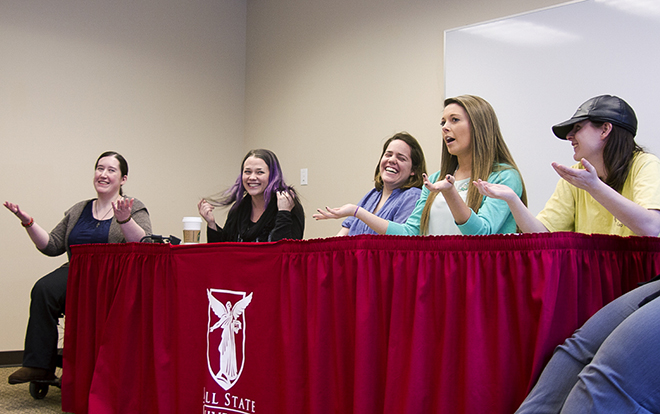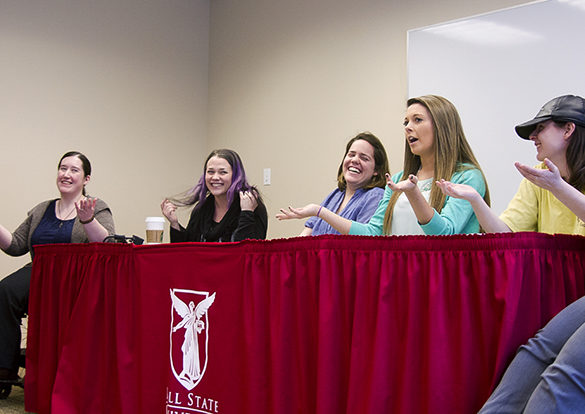At first glance, Sari Hammerstrom looks like the typical college student. She proudly wears her sorority letters across her shirt, her laptop charges beside her and she laughs as she talks about school and relationships.
Yet behind her outer appearance is a girl who cringes every time someone across the room flips the pages of a newspaper or gets distracted when a door slams or someone yells.
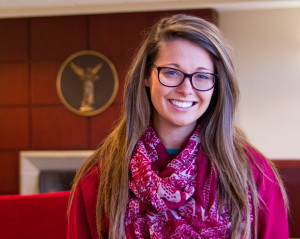
The Women with Disabilities Panel on Monday, March 24 helped shed light on students who have disabilities, both visible and invisible, according to Hammerstrom, who has ADHD. She was one of four women to speak on the panel.
“I think that learning disabilities are really underrated,” Hammerstrom said. “Just because you can’t see my disability doesn’t mean it’s not there. Hopefully [I can] make some other people in the audience who have learning disabilities feel better. It’s not easy.”
Donelle Henderlong is another student who spoke on the panel. Although Henderlong has lived with Cerebral Palsy her whole life, being in a wheelchair hasn’t stopped her from taking tests, getting around on her own, earning a Bachelor’s degree, having a job or going to graduate school.
“The purpose of the event is for people to come into a casual environment and ask questions about two things that are often stigmatized—disability and women,” Henderlong said. “It’s a good way for us to get the word out … It’s a good way for women with and without a disability to be empowered.”
![Donelle Henderlong, a student at Ball State University, [She] sat on a panel for a Women with Disabilities event hosted by the university, aimed at sharing perspectives to create understanding while disengaging from negative stereotypes.](http://ballbearingsmag.com/wp-content/uploads/2014/03/Etsler_WomenDisabilities01-300x1831.jpg)
Hammerstrom hasn’t always had support with her ADHD. Her disability caused her problems both academically and socially while growing up. Even those who were supposed to help her, like counselors and teachers in high school, struggled to understand her disability.
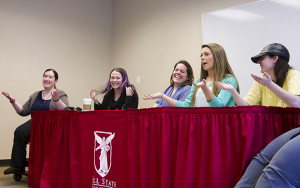
“I almost didn’t graduate high school,” Hammerstrom said. “High school was really hard for me. I had a counselor who told me that college wasn’t for everyone and that I shouldn’t waste my money sending in applications and that I should just go to Ivy Tech … I got into Ball State and the University of Kentucky, and now I’m well on my way to graduate school, so that’s exciting.”
Some of the ways Ball State is disability friendly school include an adapted Physical Education program, accessible residence halls, shuttle service and academic assistance and mentors.
Henderlong said she hopes that because of the panel, people will realize that disabilities—visible or invisible—don’t hold anyone back.
“Women with disabilities are just like other women,” Henderlong said. “I think people will see we are happy and comfortable answering questions like what we’re doing [with The Women with Disabilities Panel]. They’ll just get a bunch of different perspectives, because not all people with disabilities are the same, not all women are the same, so it will be a good variety. “
Cerebral Palsy has not kept Henderlong back. She believes she has been able to do everything that people once questioned.
“I often say that people think that disability is … a physical death sentence [or] a social death sentence,” Henderlong said. “I think people often feel bad for people with disabilities because they view it as a disadvantage.”
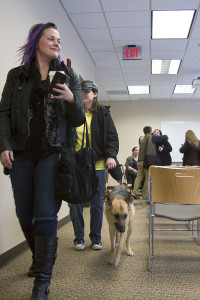
Similarly, ADHD has helped Hammerstrom to learn more about herself. She views her disability as a way to learn and to support others.
“I think you can use your disability as a crutch or you can use it as a positive tool where you can help others, and I chose not to use it as a crutch,” Hammerstrom said. “[It’s] more of a blessing than a curse, because you learn a lot from it … I learn differently and I’m not a normal student, so you have to learn to adapt, improvise and overcome.”
Both Hammerstrom and Henderlong believe that Ball State has been very adaptive to their disabilities, allowing them to do almost everything anyone else can do.
The Women with Disabilities Panel had 30 attendees, and was very successful according to Henderlong.
Thanks to the panel, Henderlong believes more people will be able to understand disabilities and take away the stigma that people have about those who are different.


